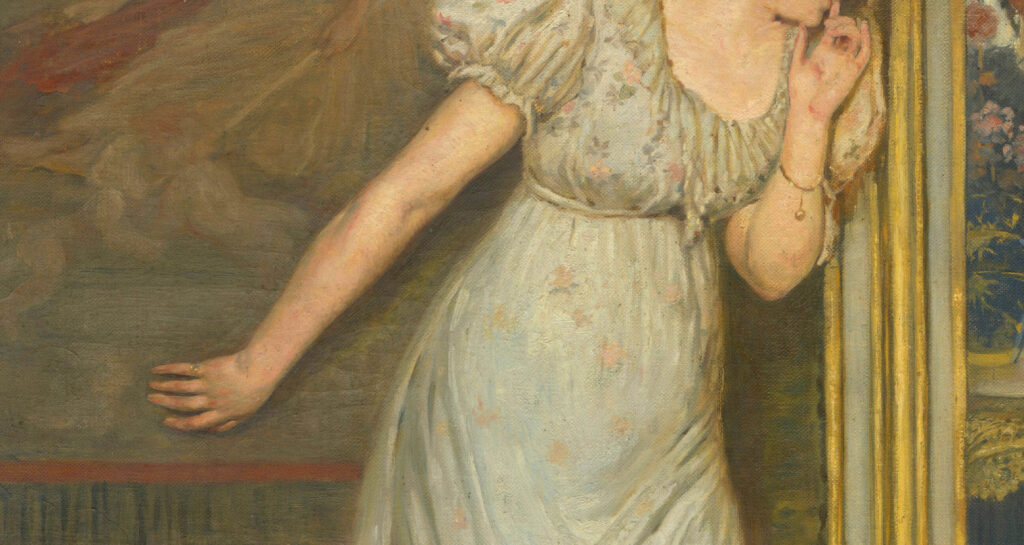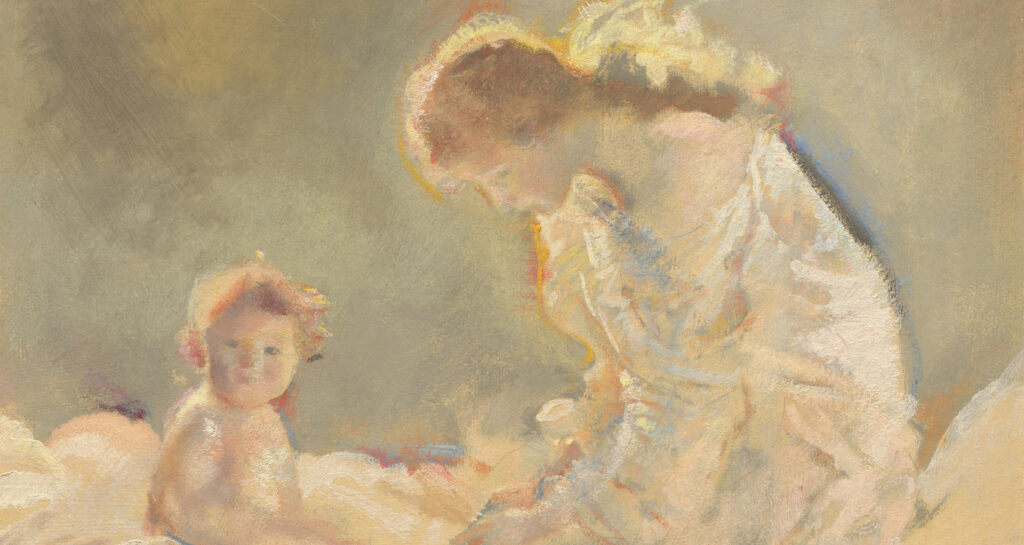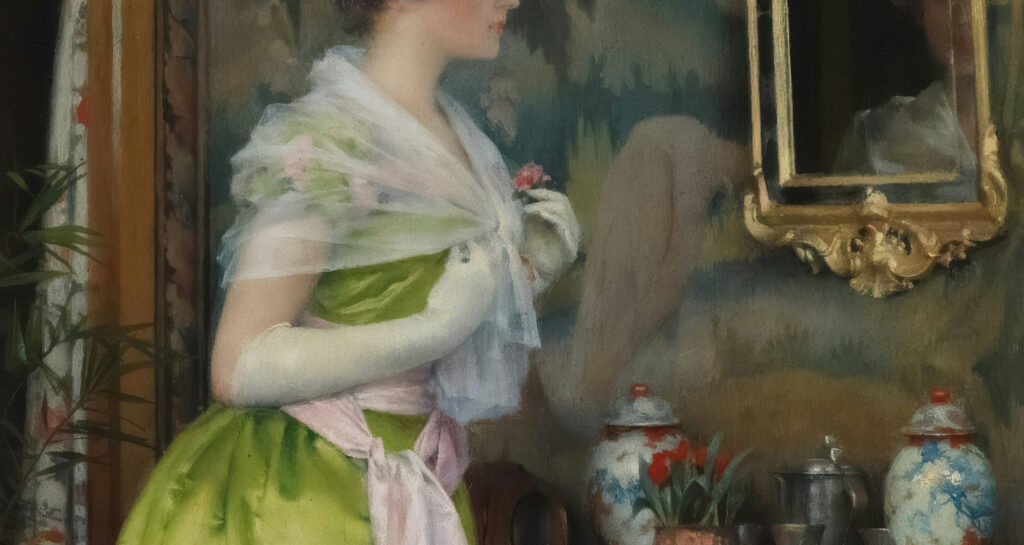Elegance as a path to God
Published on October 26, 2025

The word elegance floats around social media these days like a marketing slogan or an adjective meant to make things feel special. Influencers whisper it (asmr style) into lifestyle reels; accounts curate endless lists of “elegant habits” that often boil down to expensive perfumes, neutral-toned blazers, or elaborate morning routines. Elegance, in this modern context, is often mistaken for indulgence and an aesthetic of excess or privilege.
But this version of elegance, while charming on the surface, misses the deeper truth. True elegance has very little to do with price tags or appearances. It’s not about showing off; it’s about refinement. And refinement, properly understood, is about virtue. Elegance isn’t just a way of dressing, it’s a way of living that carves away the unnecessary so that beauty, order, and goodness can shine through.
When seen this way, elegance becomes something much more profound than “quiet luxury.” It becomes a path, a path that can lead us closer to God.

The misunderstood word
Part of the confusion comes from the word itself. In fashion or luxury branding, “elegance” is often synonymous with exclusivity or wealth. To be elegant, in that world, is to signal status. To wear silk, to drive a certain car, to sip a certain wine.
But if you trace the word back, elegance comes from the Latin eligere: “to choose.” To be elegant is to choose with care. It’s about discernment, selection, and refinement. Qualities that belong more to the interior life than the shopping mall.
Elegance, in its truest form, isn’t about possession; it’s about posture. It’s how one chooses to walk through the world with grace, with restraint, with harmony between inner virtue and outer expression.
This understanding frees us. Suddenly, elegance isn’t locked away for the wealthy or the stylish. It’s available to anyone willing to cultivate discernment in small, daily ways.

Elegance as refinement of the soul
Think of elegance as a kind of discipline, not the harsh kind, but the gentle one. A discipline of refinement. Just as a sculptor chisels away the excess marble to reveal the form within, elegance chisels away the noise, clutter, and excess of life to reveal what is essential.
In practical terms, this can look like:
- Choosing words carefully, speaking with clarity and kindness.
- Dressing simply but with intentionality, honoring one’s dignity without shouting for attention.
- Practicing hospitality not as performance but as sincere welcome.
- Cultivating order in one’s home, not for Pinterest aesthetics but to create peace.
This kind of refinement isn’t shallow; it’s deeply moral. It’s about directing our habits, manners, and choices toward something higher. In Catholic thought, this “something higher” is God Himself.

From virtue to beauty
The Greeks considered beauty the hallmark of excellence, and the Church has long taught that beauty is a path to God. Beauty elevates us by pointing us beyond ourselves. Elegance, as the refinement of beauty, plays a role here too.
Think of it:
- A woman who moves through the world with composure rather than rashness reflects patience.
- A man who dresses with care — not expensively but with respect for himself and others — reflects humility.
- A home arranged with warmth and order reflects hospitality and love.
Each of these is elegant not because they dazzle, but because they are harmonious. And harmony between body and soul, between outward expression and inward disposition, is one of the surest signs of virtue.
When our lives are refined toward harmony, we begin to mirror the Creator, who is pure order, beauty, and goodness.

Why elegance draws us toward God
- Elegance fosters humility.
True elegance is never loud. It doesn’t clamor for attention or praise. It whispers. In that humility, we glimpse God’s way of working which is quiet, steady, subtle. Like a fine fragrance you can recognize through the senses even if you can’t see it. - Elegance disciplines the passions.
When you practice refinement, you learn to say “no” to excess. You eat simply but well, buy less but choose thoughtfully, speak less but say more. This self-restraint is a training ground for virtue. - Elegance honors the sacredness of the ordinary.
Placing flowers on the table, ironing a blouse, lighting a candle before dinner. All these acts are elegant not because they’re lavish but because they recognize the holiness of daily life. They elevate the mundane, just as God elevated humanity through the Incarnation. - Elegance creates space for contemplation.
A life stripped of clutter, whether physical, emotional, or spiritual, creates silence. And silence is where God speaks.

The Saints Were Elegant Too
It might sound strange, but many saints embodied elegance in this deeper sense.
- St. Thérèse of Lisieux practiced what she called “the little way” — small, refined acts of love and patience that polished the soul like a jewel.
- St. Francis de Sales, known for his gentleness, often reminded the faithful that holiness doesn’t require drama but refinement of everyday choices.
- St. Edith Stein (St. Teresa Benedicta of the Cross) spoke of women cultivating an “interior form” that radiates outwardly. What we might call elegance of the soul.
These saints didn’t chase after appearances. They refined their virtues until their very presence became harmonious, balanced, and beautiful. That is the essence of elegance.

Elegance vs. excess
One of the easiest ways to see the spiritual value of elegance is by contrasting it with its counterfeit: excess.
Excess seeks to impress; elegance seeks to express.
Excess is noisy; elegance is quiet.
Excess is self-serving; elegance is other-oriented.
Our culture is driven by consumerism and social media, and consequently often confuses the two. But true elegance doesn’t need to be posted, flaunted, or hashtagged. It is seen in how you carry yourself in the checkout line, how you set the tone at your dinner table, how you respond to frustration.
Elegance is not about being adorned, it’s about being aligned.

Practicing elegance as a spiritual path
So how does one cultivate elegance as a path to God? A few ways:
- Start with silence. Silence is the most elegant of disciplines. Begin your day with quiet prayer, even a minute, and let that refinement ripple outward.
- Choose one gesture of refinement daily. This could be writing a handwritten note, ironing your shirt, or arranging flowers. Even something like organizing your work station and removing all the clutter before you start to work is refinement in itself. Whatever you decide to do, offer it as an act of love.
- Refine your speech. Avoid gossip, cynicism, or harshness. Speak truth with grace. Words are one of the most elegant and spiritual tools we have.
- Simplify consumption. Buy less, choose better. Eat mindfully. Restrain impulses. Elegance thrives in moderation.
- Align inner and outer. Let your outward life reflect your inner faith: order, harmony, simplicity.

Conclusion: Elegance as a quiet bridge to the divine
When elegance is understood as refinement rooted in virtue, it ceases to be frivolous and becomes sacred. It’s no longer about designer handbags or curated Instagram feeds; it’s about sculpting our daily lives into small reflections of God’s order and beauty.
True elegance doesn’t distance us from God through pride or vanity; instead it draws us closer by training us in humility, patience, and grace. It makes us attentive to the small, the subtle, the harmonious, precisely the places where God delights in meeting us.
In a world obsessed with loudness, elegance teaches us the art of quiet refinement. And in that quiet, we may just find ourselves walking more gracefully not toward status, but toward heaven.




I love everything about this article. Thank you for putting to words what has been stirring in me under the draw towards “outward” themes of minimalism, slow fashion, and homemaking, and making sense of the “interior” desires each point to.
This was such a beautiful read!! I’m so moved! Thank you. ❤️
A beautiful article. Absolutely need to share.
I agree wholeheartedly with the others’ comments! So well said!
Absolutely fantastic article and extemwly motivating
Wow!, thank you this is a breath of fresh air
Very well done!
Thank you, this really sums up the “zeitgeist” of our times– a sudden surge toward elegance and classicism, and yet distinguishes it so clearly away from materialism and spiritually centers it. I have long hoped that elegance, a stirring in my heart, was and could be of God and not simply a worldly desire.
Funny question but by chance, how did you go about curating the beautiful artwork for this article? I loved every single painting and had never seen any of them before. I would love to get my toddlers a book of this style of art (if you know of any), because I think the beauty would really speak to their souls.
This article spoke directly to me. Reminding me of what I already knew. Thank you
I can’t fully express how moved I was by this penetrating and revealing article! I’ve never read anything quite like it before. I intend to retain it, share, and read again and again. Thank you for this life-affirming gift.
I shared this with my mom friends. Thank you so much for putting into words things I was already thinking about. My mindset was off though and this put it back on track.
So beautiful are the descriptions of elegance…#Pure
The essay is elegant itself in portraying so clearly the benefits of restraint, careful consideration, and beauty.
I had never connected elegance with more than clothes and fashion. How beautiful to strive to make our whole lives elegant and a mirror of our interior lives striving for God.
Elegance in words
I’m a blue collar dad and husband, so this article’s application was questionable at first when my wife forwarded it to me… but then I remembered an impressive ornamental carpenter I once saw, packing out of a high-end residential job site at the end of a day.
He was dressed in a polo shirt and not-ratty jeans. His many tools were immaculately organized into a wood case with spots for every last tool. He was not flashy but he was very clean and clearly very, very competent!
Blue collar elegant, though most manly-men would probably just as soon be called “sweet” as “elegant!” 😉
To God Be The Glory!
This article is a Grace from Heaven for those of us making the small unseen daily efforts in our journey toward Holiness and Sanctitiy.
May God’s Guiding Hand be in the deepest recesses of our soul to lead us through it all toward our Heavenly Homeland.
A well put article. I was blessed to have an elegant wife, who could make the cheapest clothes look beautiful and her manner of speech matched your description exactly.
Loved it! Let’s all be “elegant” 🌹
This a beautiful article and so needed today to quiet our busy heads.
Please explore more.
Loved this article! Printed out to share with my rosary group. So well written and very inspirational! 2026 resolution and goals!
Great read. I’ll save this for me kids to share when they are older.
Everyone who searches for perfection cares for elegance. God and beauty are one.
Reading this article as a daily devotional. So inspiring!
Love this article!